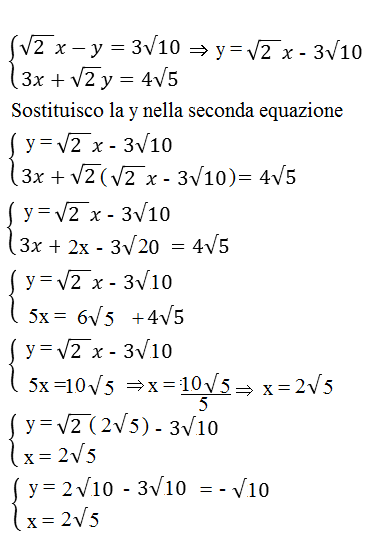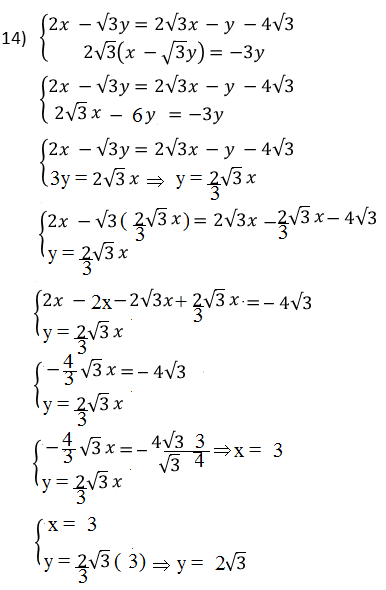Esercizi sulle equazioni con i radicali
1) ( + 1 )(x + 1) = 2 (2 – x) risultato:
2) risultato:
3) 5(x +
) – 10
(1 +
x) – 5(
– 10) = 0 risultato: 1
4) risultato: 1
5) risultato:
6) risultato: 6(
+ 1)
Esercizi sulle equazioni fratte con i radicali
7) risultato:
8) =
risultato:
Disequazioni con i radicali
9) x(x + 1) + 1 + > x² +
(x + 1) risultato: x < 1 +
10) (3 + 2
)(x +
) – (x + 4
)(
+ 2
) < – 7 risultato: x <
11) >
risultato: x >
Sistemi con i radicali
13)
Svolgimento
1) ( + 1 )(x + 1) = 2 (2 – x)
x +
+ x + 1 = 4 – 2x Portiamo tutte le x al primo membro
x +x + 2x = 4 –
– 1
3x + x = 3 –
raccogliamo la x
x(3 + ) = 3 –
x = Razionalizziamo il denominatore moltiplicano numeratore e denominatore per
in modo di ottenere al denominatore la somma per differenza
x = ·
=
=
=
x =
2)
x + 2 +
x – 5 =0
x+
x = – 2 + 5
x( +
) = 3
x = ⋅
=
=
=
x =
3) 5(x +
) – 10
(1 +
x) – 5(
– 10) = 0
5 x+
– 10
– 10·5 x – 5
+50 = 0
5 x+
– 10
– 50 x – 5
+ 50 = 0
5 x -50x =+ 5
– 50
x( – 50) = 5
– 50
x = = 1
x = 1
4)
2x²
+
– ( x² + 3
) – (x² + 2 +2
) =
–
– 3 +
– 2 –
2x²
+
– x² – 3
– x² – 2
=
–
– 3 +
– 2 –
2x²- x²- x²
=
–
– 3 +
– 2 –
–
+ 3 + 2
x =
x(
) =
x = = 1
x = 1
5)
x = ·
=
=
=
x =
6)
=
·
=
=
x =
7)
C.E. ≠ 0 ⇒ x ≠
⇒ x ≠
≠ 0⇒ x ≠ –
⇒ x ≠ –
x = =
•
x = =
=
x = =
questa soluzione è accettabile perchè è diversa da +
e –
8) =
C.E.
5x – ≠0 ⇒ x ≠
5x + ≠0 ⇒ x ≠ –
x = =
x = •
=
=
x = La soluzione è accettabile perchè diversa da ±
9) x(x + 1) + 1 + > x² +
(x + 1)
x² +x + 1 +
x² + x +
x + 1 > x
x – x > – 1 ⇒ x(1 –
)> -1
x < quindi x <
•
x <
x <
10) (3 + 2
)(x +
) – (x + 4
)(
+ 2
) < – 7
< -7
< -7
<
<
x < ⇒ x <
⇒ x <
11) >
> 0
> 0
> 0
6x – 6x + 20x – 7x >
13x > ⇒ x >
x >
13
x = ; y=
risultato:x = 3 ; y=



